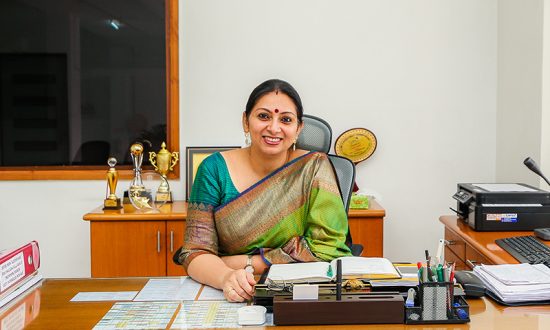Pallavi Upadhyaya is the Principal of Delhi Public School – Raj Nagar Extension, Ghaziabad. A postgraduate in Zoology, Upadhyaya has more than 20 years of experience in the Teaching and administrative department. Prior to the Principal of DPS – Raj Nagar Extension, she has worked as the Principal, Delhi Public School, Civil Lines Aligarh from April 2013 to September 2014 and continued as the Principal, Delhi Public School, Aligarh from the October 2014 till June 2017. She was also appointed as a Member of the Inspection Committee to a number of schools and was a City Coordinator to Conduct the UGC NET from 2015 to 2017.
In this digital era, student engagement can’t be forced but it sure can be fostered. To really increase student engagement, you must know your students and find out what makes them tick. And remember that there’s no substitute for experience – create as many opportunities for hands-on learning. The more time a student will spend doing a task himself/herself rather than hearing or watching a teacher do it, the more engaged he/she will be.
Now, providing authentic, specific, and frequent feedback is extremely important as it’s hard for students to stay engaged if they don’t know where they stand. Students love to know that they’re making progress or are doing a good job. On the other side, teachers need to remember that the most important resource in their classroom is the students themselves. So, giving the students voice and choice is extremely important.
Role of Technology in Education
These days the role of Information and Communication Technology (ICT), in the education sector is pivotal especially in the process of empowering the technology into various educational activities. The use of ICT in education adds value to teaching and learning, by enhancing the effectiveness of learning. It added a dimension to learning that was not previously available. After the inception of ICT in schools, students found learning in a technologically enhanced environment more stimulating and engaging than in a traditional classroom environment.
I personally support use of technology in school operations as it makes the work more effective and convenient. Technology is an important tool in managing day to day school operations. Technological systems now track all kinds of information – from parents reporting student absence to teachers recording grades to administrator’s analyzing data. There are software tools that help students collaborate on assignments and keep parents up to date on their students’ progress.
However, engaging the students can be difficult in this time of technology. Students are always having constant distractions, and the sad truth is that their attention spans are getting shorter. The student of today is living in the digital era hence the technology can be used to reap positive effects. Technology in the classroom allows students to gain a deeper understanding of topics that interest them, collaborate with each other, and direct their learning.
- The students can submit assignments in forms of blogs, podcasts or videos.
- Students can work with a classroom on the other side of the world.
- Infographics can be used to explain complicated topics.
These are some ways by which technology can be incorporated to have an interactive and engaging class environment.
The Future of Education
Technology has catalyzed the growth of the education industry; witnessing the emergence of new learning solutions. The shift towards digital transformation is encouraging concept-based learning among students which is enabling them to build core-skills and be future-ready for jobs. This is also shifting the focus from teacher-centered learning to student-centered learning.
The DIY (Do- it- yourself) learning is reshaping education. Personalized learning- Massive Open Online Courses (MOOCs) are providing an affordable and flexible way to acquire new skills and deliver quality educational experiences to various learners through videos or live chat sessions.
Artificial intelligence & gamification technologies have transformed the approach towards learning completely. It increases engagement by capturing the interest of learners. With technology takeover and globalization, the education system is changing very fast. The future will be a time of Edu-tech, digital learning and online education. Our education policy has already undergone quite a few phenomenal changes.
Balancing Academics and Extracurricular Activities
A healthy balance of academics and extracurricular activities is key to successful school experience. In our school, monthly planners are designed to incorporate innovative extracurricular activities with the regular curriculum. We also develop block teaching schedules to accommodate major events without hampering the academics. Academics is typically an acquired flair; however, every child is gifted with a special talent. Extracurricular activities encourage children to bring out their talent in the limelight and give it wings in the right direction.
Integrating extracurricular activities with children’s academic life can also help children to manage their time and set priorities and widen their perspective about the world at large. Academics and extracurricular activities go hand in hand to raise well-rounded individuals and independent learners. It is imperative that we provide our children with an environment that fosters their overall personality and not just academic growth.
I feel that today the prominent challenge includes resistance to technology. It comes in many forms, but one of the key resistance challenges is “comfort with the status quo”. Teachers are often comfortable with their routine methodologies. However, students deserve a relevant, modern, customized education that helps them acquire 21st-century skills. I feel that the students and facilitators should keep abreast of technology trends and changes. Stay updated of progress and news in the area of education technology. Make use of free apps, videos, graphics, and software available. It is time for education to catch up with our technologically enhanced society. (As told to the Editor)




